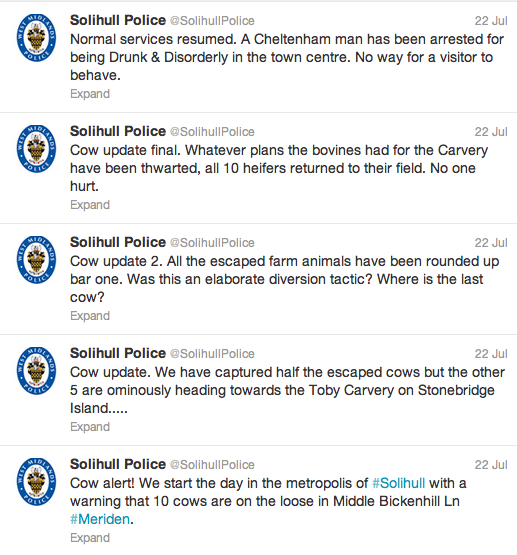Social Business – Beyond Social Commercials
At the end of 2011, during an interview at the Social Workplace Conference, in London one of the questions posed to me was “what conversations would you like to be having about social media in the work place in 24 months time?”
Well, it’s twelve months on, so it’s an interesting checkpoint to see what sort of conversations we are actually having. There are some very human conversations, like this recent set of tweets from the Solihull Police: (read from bottom up, it being Twitter):
Whilst that was a very lighthearted set of messages, if you follow the Solihull Police tweet stream you’ll see they are also using it to help track down suspected criminals, and keeping their community up to date with local information. You’ll also see lots of two way dialogue, and inbound and well as outbound communication. At the other end of the spectrum, some organisations are being much more ‘commercial’ in their social media use, by ‘commercial’ I mean in the advertising sense of the word.
Last the weekend I went to the Olympic torch ceremony in Guildford. The Lloyds TSB ‘social media’ team were there, inviting people to “have their picture taken and posted to their Facebook page.” – a very nice ad insertion for them for sure, but really not very social (or for that matter, very imaginative). Traditional marketing is being shoe horned into social platforms left right and centre. Compare that with the Solihull Police example, or companies like Dell, who are using social media to encourage their customers to share business advice, and provide technical support. I’ll come back to Dell in a moment.
The revolution of communications from broadcast, to feedback channel, to conversation, to network is far from complete, and organisations continue to make steps and missteps as they adapt to the new technology. Organisational structures are changing, and so communications channels need to adapt to suit them.
What is now often called “social business” has its historical roots prior to the industrial revolution, which enabled process at scale. As a side effect, they set the dominant forms of business communication that are still in place today. However, the business challenge, like manufacturing, has moved on. The next challenge is to enable businesses to carry out innovation at scale. That requires re-humanizing organisations, rebuilding relationships and transforming them into more friendly, enjoyable places to work, that can foster and sustain cross-functional collaboration. If you’ve missed out on the Web 2.0/Social Business trend, this Harvard video with Andrew McAfee is a handy introduction:
There is a danger that businesses do nothing more than ‘go through the motions’ of using social software, failing to grasp the opportunity to transform their culture and communications, to unlock the discretionary effort of staff and customers, and create sustainable competitive advantage for themselves. Of course change isn’t necessary, because, as Demming put in, survival isn’t mandatory. Some businesses will adapt, and some won’t; there will be winners, and there will be losers.
If you want to talk more about how social media can be used in your business, and you are in the UK, an event to have on your calendar is the next Dell B2B Huddle, which will take place at Microsoft’s offices in London. Put together with Kerry Bridge from Dell, Simon Hughes of Microsoft and the insightful, and independent, Neville Hobson. You can join the discussions about the event in the LinkedIn group, or leave a comment here.


